Tackle office
nightmares
How to cope with tricky situations and people
BLOOMSBURY
A BLOOMSBURY REFERENCE BOOK
Created from the Bloomsbury Business Database
www.ultimatebusinessresource.com
Bloomsbury Publishing Plc 2004
All rights reserved; no part of this publication may be reproduced, stored in a retrieval system, or transmitted by any means, electronic, mechanical, photocopying or otherwise, without the prior written permission of the Publisher.
No responsibility for loss caused to any individual or organisation acting or refraining from action as a result of the material in this publication can be accepted by Bloomsbury Publishing or the authors.
First published in 2004 by
Bloomsbury Publishing Plc
38 Soho Square
London W1D 3HB
British Library Cataloguing in Publication Data
A CIP record for this book is available from the British Library.
eISBN: 978-0-713-67868-0
Design by Fiona Pike, Pike Design, Winchester
Typeset by RefineCatch Limited, Bungay, Suffolk
Printed by Clausen & Bosse, Leck, Germany
All papers used by Bloomsbury Publishing are natural, recyclable products made from wood grown in well-managed forests. The manufacturing processes conform to the environmental regulations of the country of origin.
Contents

Answer the following questions, then read the guidance points for advice on how best to deal with your situation.

How political is your workplace?
a) Not very b) Fairly c) Very
How many trusted allies do you have at work?
a) I trust most people. The atmosphere is very open and relaxed.
b) I have a few very good friends at work who I trust.
c) None. I keep my guard up at all times.
How cliquey do you consider your workplace?
a) Not very b) Fairly c) Very
How comfortable are you with confronting colleagues about tricky issues?
a) Very b) Fairly c) Not at all
How high is morale in your workplace?
a) Pretty high b) Generally c) Low okay
How well do you think your managers have handled difficulties in the past?
a) Well b) Okay c) Badly
How would you describe the management culture in your organisation?
a) Friendly
b) Intimidating at times
c) Bullying and discriminatory
How often do you feel discriminated against, for whatever reason (gender, religion, ethnic/social/cultural background, disabilities, age, sexuality, education)?
a) Hardly ever b) Rarely c) Regularly
How often do you feel put upon at work?
a) Rarely b) Sometimes c) Regularly
How do you feel about your boss?
a) I respect his or her management skills.
b) I feel awkward at times, but generally okay.
c) Im not keen.
You suspect that a colleague dislikes you. How do you deal with it?
a) Speak to him or her to find out why.
b) Act normally and hope he or she gets over it.
c) Try to avoid him or her.
How many of the following do you feel you experience regularly: bullying, discrimination, being taken for granted, others taking credit for your work, being blamed unfairly, decisions made over your head, lack of communication?
a) 12 b) 34 c) 57
a = 1, b = 2, and c =
Now add up your scores.
Everyone should read chapter as it offers advice on dealing with an unavoidable feature of any workplace office politics.
 1220: While you seem to be happy at work, it is important to keep an eye out for colleagues who may be having difficulties (chapter ). Make sure you are aware of the legal side of discrimination (chapter ), and watch out for the signs of drug or alcohol misuseyou may be able to help before it is too late (chapter ).
1220: While you seem to be happy at work, it is important to keep an eye out for colleagues who may be having difficulties (chapter ). Make sure you are aware of the legal side of discrimination (chapter ), and watch out for the signs of drug or alcohol misuseyou may be able to help before it is too late (chapter ).
 2130: Youre doing well, apart from a few seemingly inescapable difficulties. You must be aware that the problems may lie with youChapter suggests new approaches to such challenges. If you have a difficult relationship with your boss, read chapter for advice.
2130: Youre doing well, apart from a few seemingly inescapable difficulties. You must be aware that the problems may lie with youChapter suggests new approaches to such challenges. If you have a difficult relationship with your boss, read chapter for advice.
 3136: You seem unhappy about many aspects of your work. If you feel you are being unfairly treated, read chapters , , and to determine the cause of the problem and find suggestions for how you can improve your situation. Chapter suggests new ways of thinking which may help ease your discontent.
3136: You seem unhappy about many aspects of your work. If you feel you are being unfairly treated, read chapters , , and to determine the cause of the problem and find suggestions for how you can improve your situation. Chapter suggests new ways of thinking which may help ease your discontent.

Life would be wonderful if you could work in an office without worrying about other people and what theyre up to. But everyone has a network of relationships throughout the organisation, and if you dont handle them carefully, you could be heading for an office nightmare.
You dont have to work somewhere long to work out whether or not is has a political culture. In these organisations, who you know tends to matter more than what you know. Friendships and casual conversations take on a new significanceone wrong word to the wrong person could end up scuppering that promotion.
The context in which people have come to know each other is also important in a political culture, as that can imply certain kinds of loyalty. Family, school, or social networks that intrude into professional territory can embroil people in all sorts of Machiavellian manoeuvrings that eventually create a politically charged workplace. If you find yourself in this sort of minefield, this chapter offers advice on how to pick your way through. It also suggests ways for managers to avoid and discourage politicking.

Step one: Watch for signs of office politics
Politics plays a part in all organisations; it is an inevitable effect of putting human beings together in some sort of hierarchical arrangement. Indicators of office politics are often fairly easy to pick upjust hang around near the kettle, water cooler, or canteen in any organisation.
 Listen out for clues about how the business works under the surface. Perhaps you might hear comments from people who have been passed over for promotion in favour of the recruiting managers former golf partner.
Listen out for clues about how the business works under the surface. Perhaps you might hear comments from people who have been passed over for promotion in favour of the recruiting managers former golf partner.
 Watch out for those who succeed by publicly supporting their boss, or by ensuring that they are always in the right place at the right time. Such successes again indicate that hidden agendas may be at play.
Watch out for those who succeed by publicly supporting their boss, or by ensuring that they are always in the right place at the right time. Such successes again indicate that hidden agendas may be at play.

TOP TIP
If youre already embroiled in a political situation, its important to go through the correct channels to avoid compromising yourself further. Explain what has happened to your supervisor or manager. If the political situation involves your boss, you may want to approach your human resources department if you have one to ask their advice about how to proceed.

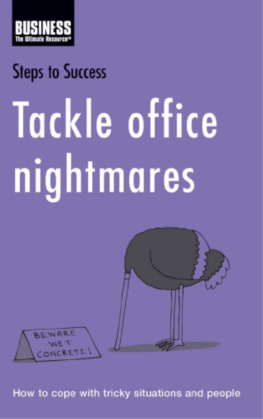




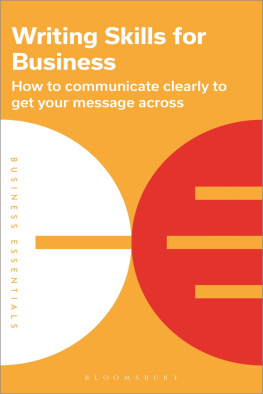

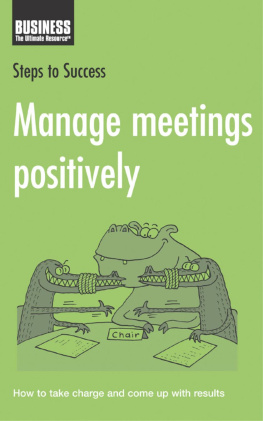
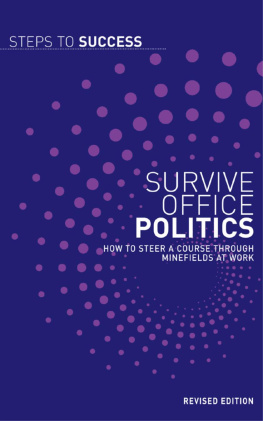
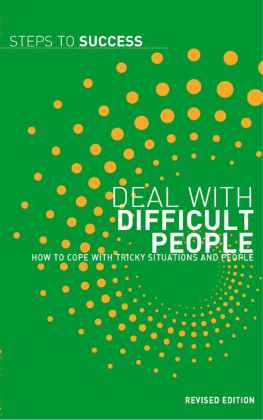


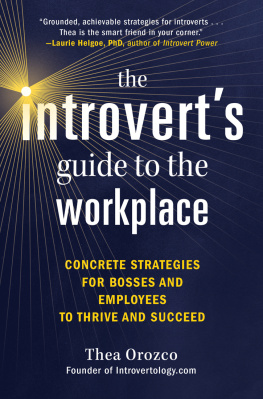

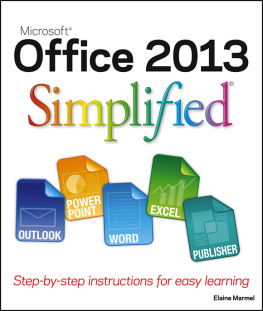


 1220: While you seem to be happy at work, it is important to keep an eye out for colleagues who may be having difficulties (chapter ). Make sure you are aware of the legal side of discrimination (chapter ), and watch out for the signs of drug or alcohol misuseyou may be able to help before it is too late (chapter ).
1220: While you seem to be happy at work, it is important to keep an eye out for colleagues who may be having difficulties (chapter ). Make sure you are aware of the legal side of discrimination (chapter ), and watch out for the signs of drug or alcohol misuseyou may be able to help before it is too late (chapter ). Listen out for clues about how the business works under the surface. Perhaps you might hear comments from people who have been passed over for promotion in favour of the recruiting managers former golf partner.
Listen out for clues about how the business works under the surface. Perhaps you might hear comments from people who have been passed over for promotion in favour of the recruiting managers former golf partner.